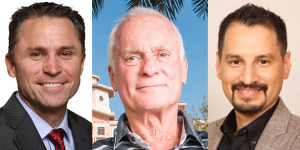Podcast: Play in new window | Download

You are about to be inspired and challenged about how you think about value-based care. Since 1991, Rosen Hotels & Resorts has offered an innovative in-house healthcare program called RosenCare that has been improving lives for employees and the community, as well as saved the company approximately $450 million since its inception.
Our guests this week are Harris Rosen, businessman, investor and philanthropist who founded Rosen Hotels & Resorts and serves as the company’s president and COO; Kenneth Aldridge, Director of Health Services for Rosen Medical Center, the onsite medical home and primary care ecosystem; and Ashley Bacot, President of Provinsure, an independent insurance consulting arm owned by Rosen.
The takeaways from this conversation are multi-faceted and can be applied to ACOs, health plans, and employers. This interview will allow you to re-think how local community engagement and partnerships fit into your healthcare strategy. RosenCare’s approach will force you to reconsider how you approach access, quality, service, costs, innovation. Saving costs and improving lives, this model is ripe for replication and needs to become the norm in our race to value. In the words of Mr. Rosen, “We need to, as a nation, build a much better health system. If we replicated the RosenCare program nationally, we would save over a trillion dollars annually! Let’s use that money to pay off our national debt. Health care can be the treasure that changes America.”
Episode Bookmarks:
01:45 Background on Rosen Hotels & Resorts and its innovative in-house healthcare program (RosenCare) that saved $450 million!
03:45 Introduction to Harris Rosen, Kenneth Aldridge, and Ashley Bacot
07:00 Rosen Hotels & Resorts spends 50% less per capita than the average employer (cost “per covered life” is ~$5,500)
08:20 Mr. Rosen explains how the military adages of the 6P’s and KISS guides his entrepreneurial vision
09:20 The birth of RosenCare in 1991 due to uncontrollable and rising health insurance premiums (Mr. Rosen)
10:00 Lowering healthcare costs 20% but still facing premium escalations…time to become a self-insured plan and build our own clinic! (Mr. Rosen)
14:20 “Our success wasn’t that complicated. Scary…yes. Uncertain…of course. But we did it, and we saved $450-500M in healthcare costs over the last 40 years.”
16:05 How Mr. Rosen leads others and built a such a strong culture that company associates want to be a part of (Ashley)
18:40 How working diligently to keep people healthy drives both good outcomes and a healthy bottom line (Mr. Rosen)
19:05 Social determinants of health and the challenges of keeping associates healthy (Kenneth)
20:20 “This is advanced, direct primary care on steroids!”
22:00 The strength of Rosen’s self-insurance plan, Third Party Administrator, and direct contracting model (Ashley)
24:00 Designing steerage into the benefit design (Ashley)
25:30 The unfounded fears by employers in redesigning health insurance benefits (Ashley)
27:30 An Overview of Rosen Medical Center, A Place for Healing and Wellness
29:00 The importance of relationship-based care at Rosen Medical Center (Kenneth)
34:30 How RosenCare addresses the issue of low value care with PBM formulary selection and surgery options (Kenneth)
36:00 How non-traditional treatment (e.g. medical marijuana) have a role to play in eliminating traditional options of treatment that are of lower value (Kenneth)
39:00 How RosenCare approaches direct contracting with hospitals (Ashley)
40:15 The importance of employers having the courage to be self-insured and the need for reforms in hospital reimbursement (Mr. Rosen)
42:00 “Hospitals must try to be fair and equitable. They should publish costs and outcomes online.”
43:20 The powerful hospital lobby and its concern for income preservation at the sake of ethical business behavior (Mr. Rosen)
45:00 The horrible financial situation that patients face in typical American health care (Mr. Rosen)
45:45 Removing barriers to care allows people to make good choices (e.g. deductibles, transportation, missing work) (Ashley)
49:00 How RosenCare eliminated out-of-pocket financial risk burden for its associates who undergo hospitalization (Mr. Rosen)
50:00 How Rosen Medical Center is able to care for high-risk patients to achieve better outcomes and lower PMPY (Kenneth)
51:00 The acceptable risk of adverse selection when “the word gets out” (Ashley)
53:00 The importance of massively powerful, relationship-based primary care (Kenneth)
55:00 The need to spend time with patients in the primary care setting (Kenneth)
56:00 Behavioral health integration and telepsychiatry within the RosenCare health ecosystem (Kenneth)
57:00 Addressing SDOH to improve patient compliance (Kenneth)
58:00 Patient compliance rates are 2-3X the national average and how behavioral health spend lowers medical spend (Ashley)
60:00 The egregious flaw in the health system that under rewards primary care (Ashley)
61:00 Community investments in Tangelo Park (free preschool, free college tuition) and how that has reduced crime and improved high school graduation rates (Mr. Rosen)
67:45 How other employers can replicate the RosenCare model through leadership (Ashley)
69:30 The economic imperative to fix healthcare through employer-based reforms (Kenneth)
70:00 How fixing healthcare at a national level can save trillions of dollars, pay off our national debt, and save America (Mr. Rosen)
